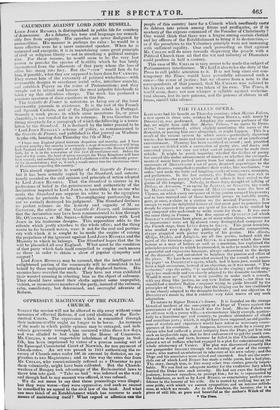OPPRESSIVE MACHINERY OF THE POLITICAL CHURCH.
SURELY the session will not be allowed to slip away without some measures of' effectual Reform, if not total abolition, of the Eccle- siastical Courts. The oppression which is committed through their instrumentality ought no longer to be borne. An instance of the mode in which public opinion may be outraged, and indi- viduals grievously wronged, has occurred within these few days, and was alluded to last night in the House of Commons. Mr. Churls, a most respectable inhabitant of Bungay in Suf- folk, has been imprisoned by virtue of a process issuing out of the Episcopal Consistorial Court of Norwich, for non-payment of Chuich-rates. An act was passed in 1813 authorizing the re- covery of Church-rate's under 10/. in amount by distraint, on ap- plication to two Magistrates; and in this way the rates due from Mr. CHILDS, who conscientiously refused as a Dissenter to pay them voluntarily, might have been collected. But the Church- wardens of Bungay took advantage of the Ecclesiastical laws to throw him into gaol. "Take no bail" was indorsed on the writ; and though bail to any amount was offered, it was refused.
We do not mean to say that these proceedings were illegal; but they were worse—they were oppressive, and such as cannot be remedied by an appeal to the civil law of the land. And what can men think of an Establishment which has recourse to such means of maintaining itself? What iegard or affection can the
people of this country have for a Church which needlessly caste its debtors into prison among felons and profligates, as if in mockery.of the express command of the Founder of Christianity ? One would think that there was a league among certain clerical and lay officers of the Establishment to bring it to destruction,— as if the proselytes to the Voluntary principle were not increasing with sufficient rapidity. One such proceeding as that against Mr. CHILDS will do more towards disgusting the people with a Political Church than ail that the wit and industry of Dissenters could produce in half a century.
This case of Mr. CHILDS is very proper to be made the subject of Parliamentary interference. We hold it also to be the duty of the Press to call public attention to it. It is not long since our con- temporary the Times would have powerfully advocated such a cause—the cause of justice ; but we observe from a note to the correspondents of that journal, that Mr. CHILDS was referred to his lawyer, and no notice was taken of his case. The Times, it would seem, dares not now whisper a syllable against ecclesias- tical abuses, lest its new patrons, and the patrons of abuses in all forms, should lake offence.


























 Previous page
Previous page